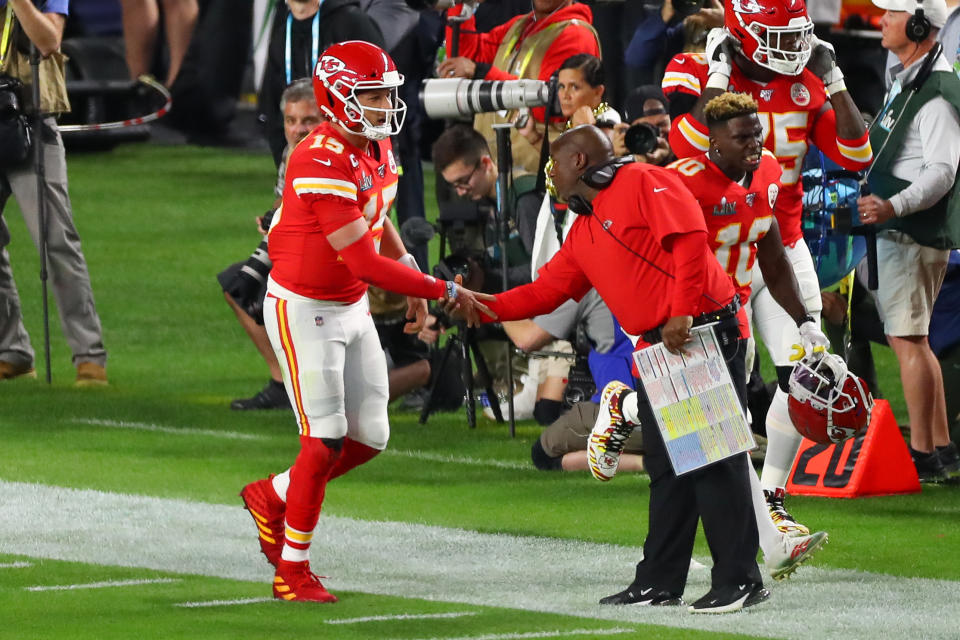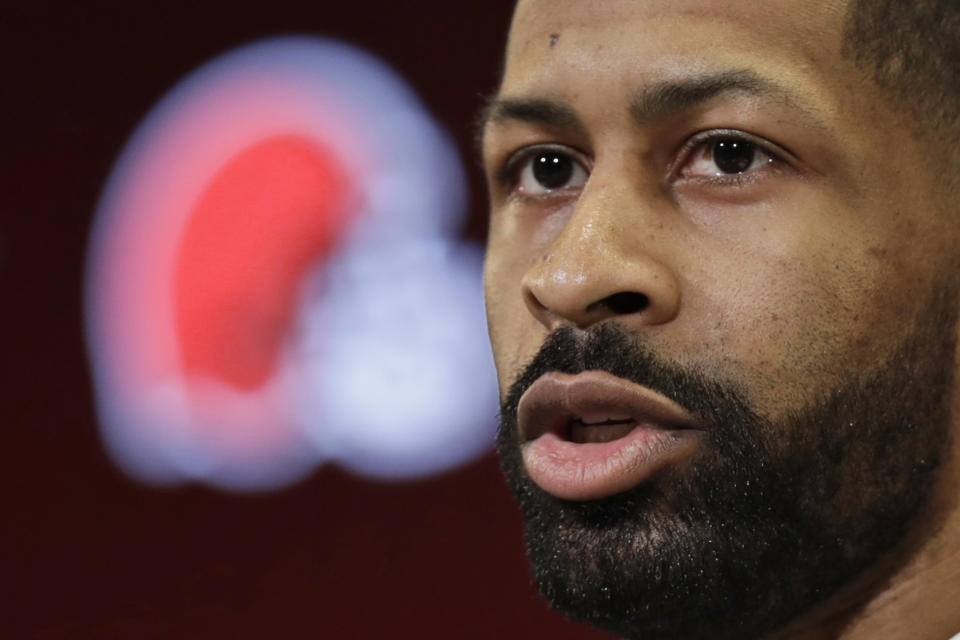Faith in Rooney Rule is waning, but there's optimism with new proposal: 'I hope it’s just not a lot of talk'
When the NFL held its annual draft in late April, a stunning visual repeated itself.
Cameras zoomed in on the head coach and general manager of the team on the clock, with those franchise decision makers sitting at home with their respective families. Over and over again, the coach or general manager was white. Then the camera cut to the player who was selected, many of whom were black, and the contrast could not have been more clear:
Despite the NFL players being 70 percent black, only four of the 32 teams have minority head coaches. Two have minority general managers. This discrepancy, illustrated throughout the three-day event, introduced millions of viewers to a jarring reality they could not help but notice, one that several black coaches, scouts and front-office executives across the NFL were already painfully aware of.
“The best thing that could have happened is that virtual drafting,” one minority NFL personnel man told Yahoo Sports. “Everybody in America saw it. They’re like, ‘Where are the black people?’ Now everybody sees we’re not just crying and whining. It’s true.”
Yes, the optics were awful. Now, the NFL is potentially on the verge of doing something about it.

League trying to make up for Rooney Rule’s shortcomings
On Friday, Jim Trotter of NFL.com reported that team owners will vote next week on a resolution that would incentivize clubs to hire more minorities by awarding them potentially valuable third- or fourth-round draft picks for hiring and/or developing minority candidates.
The fact the NFL needed to craft a proposal like this is a strong admission of institutional failure to adequately promote diversity among its leadership ranks.
Given that the NFL has only four minority head coaches, down from eight in 2018, and two general managers, down from six in 2017, the gesture is appreciated in some circles.
“If they’re gonna truly do that, I think that’s great because the Rooney Rule is a joke,” one personnel man told Yahoo Sports.
Some can’t help but question the effectiveness of the proposal, especially after an offseason in which Eric Bieniemy, the offensive coordinator for the eventual Super Bowl champion Kansas City Chiefs, was interviewed three times for head coaching jobs but passed over each time.
“The idea that the NFL might unearth the next example of leadership excellence through a more inclusive mindset should be incentive enough,” an assistant coach said.
“I hope it’s just not a lot of talk,” one of the personnel men added. “Why do you need incentive to go out and hire the best candidate?”

‘Hopefully, this is just a first step’
The same people who have largely failed to hire minority coaches and executives for the past decade are the same people who will be doing the hiring, which isn’t reassuring.
“It gives them some incentive for sure,” one of the personnel men said. “But they definitely still have to say ‘yes’ to hiring us. You can tell me how pretty I am, but are you gonna take me on a date or marry me?
“It sounds good, and it’s something that sounds better than the status quo. But at the same time, a plan is just that until it comes into play.”
The coaches and personnel men I spoke to agree that the proposal is interesting, at least on paper.
While plenty of attention is on the head coaching and general manager component of the proposal — which would improve the third-round draft picks of teams that hire minorities for those positions — the way it could incentivize teams to hire more coordinators of color is intriguing. If the proposal passes, the Rooney Rule, which requires teams to interview minority candidates for head coaching and senior football operation jobs, would also apply to coordinator positions, theoretically giving more minorities an opportunity to make a strong impression for what have traditionally been stepping-stone assistant coaching jobs.
Additionally, if a minority assistant coach was to become a coordinator for another team, the team he just left would receive a fifth-round compensatory pick, thus giving teams some motivation to develop qualified minority coaching candidates. The proposal goes further for quarterbacks coaches, a prime pipeline in today’s NFL, as teams that hire a minority at that position stand to receive a fourth-round compensatory pick provided the coach lasts beyond one season.
Throw in the lifting of interviewing restrictions and the hope is that the totality of these changes would motivate teams to develop and hire qualified candidates.
“I think the OC/DC aspect of it is good,” another minority NFL assistant told Yahoo Sports. “I’m not sure if the [head coaching] piece of it will work. Hopefully, this is just a first step at addressing the issue.”
Especially since there’s concern about how this could work. One problem, for instance, is that many minority coaching candidates are already dealing with the stigma of being a “token Rooney Rule guy.”
“And now,” one of the personnel men noted, “you’d be battling being a token guy because they want to be compliant or get a draft pick.”
Even if qualified minority head coaching candidates get hired, will they be given enough time to succeed? Steve Wilks was fired after only one season in Arizona as head coach in 2018, while Vance Joseph was given only two years in Denver despite lacking a quarterback.
Meanwhile, Jerry Reese, the first African-American general manager to win a Super Bowl, was fired by the New York Giants after his fourth losing season in five years with 2017.
“A lot of GMs that are in this for a long time have some swings and misses,” one of the personnel men said. “Minnesota has a great front office, but they’ve had some misses. Still, they’ve been given the longevity to stick with it. Even Ron Wolf went 0-14 in Tampa Bay as vice president of football operations. For every Hall of Fame executive, there are some misses. You have to give them some leash to fail because that’s the business.”
And that, ultimately, is what the success of this proposal will come down to, the coaches and executives interviewed all agree. While the proposal has its flaws, the status quo isn’t working either.
If it gets passed, team owners still have to legitimately cast wider nets when hiring for front-facing leadership positions for this to work.
If they don’t follow through fully, we’ll likely be right back here in a few years, having the same sad conversation while bemoaning embarrassing minority leadership numbers about America’s favorite sport.
“If they vote for it, they have to stick with it,” one of the personnel men said. “Don’t do it for two or three years and get rid of it. Stick with it and see what happens.”
More from Yahoo Sports:

